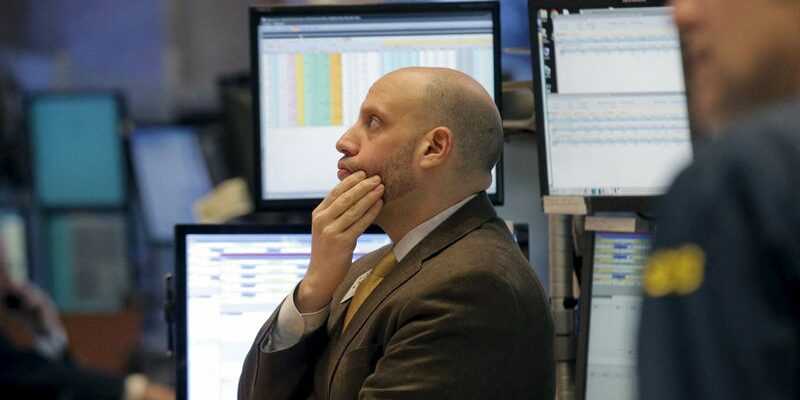PARIS (Reuters) – Wall Street is expected to fall at the opening on Friday and European stocks are trading in the red at mid-session, concerns over monetary policy and geopolitical unrest once again favoring risk aversion on the markets. financial markets.
Futures contracts are signaling an opening down 0.9% for the Dow Jones, 1% for the Standard & Poor’s-500 and 0.4% for the Nasdaq, despite results beating expectations from giant Apple.
In Paris, the CAC 40 lost 2.31% to 6,861.55 points around 12:40 p.m. GMT. In Frankfurt, the Dax lost 2.46% and in London, the FTSE lost 1.41%.
The pan-European FTSEurofirst 300 index fell 1.86%, the Eurozone EuroStoxx 50 fell 2.53% and the Stoxx 600 fell 2.01%.
The latter is heading for another week of declines and its worst monthly performance since October 2020. Risk appetite is suffering from concerns about the extent and pace of upcoming monetary tightening in the United States and geopolitical tensions between Russia and Ukraine.
Added to this is the sharper than expected contraction in German economic growth over the last three months of 2021, to 0.7% against 0.3% for the Reuters consensus, under the effect of health restrictions.
Investors will watch the release at 1:30 p.m. GMT of monthly US household spending figures and a key measure of inflation, central to Federal Reserve policy. Economists polled by Reuters expect the PCE consumer price index excluding energy and food to have risen 4.8% year on year in December.
In trading before the US markets open, Apple is up more than 3% after posting quarterly revenue, a gain that shouldn’t be enough to support the US rating.
VALUES IN EUROPE
With the Federal Reserve’s upcoming tightening cycle, the Stoxx Technology Index shed 2.98% to its lowest level in a year, entered a bear market, defined by a down more than 20% from the recent high.
After having taken up 5.75% in session thanks to its good quarterly results, the world number in the luxury industry LVMH is now yielding 0.45% carried away by the general decline in the market.
Caixabank, Volvo and Electrolux fell between 1.81% and 5.21% after all three reported lower fourth-quarter earnings.
Alstom fell 7.88% after Exane BNP Paribas’ recommendation was downgraded from “outperformance” to “neutral”.
On the rise, JCDecaux climbed 7.86% after well-received results and H&M advanced 2.6% after announcing quarterly profit above expectations, a share buyback program and the payment of a dividend.
RATES/EXCHANGES
The prospect of an acceleration of monetary tightening in the United States continues to support bond yields: that of ten-year Treasuries takes more than three basis points to 1.8391% and its German equivalent, benchmark for the euro zone, has recorded an eight-day peak, at -0.018%.
For the same reason, the dollar is moving to its highest since July 2020 against other major currencies (+0.12%).
The euro thus suffered its fifth consecutive session of decline to return to 1.1139 dollars, after a low since June 2020, at 1.1119.
OIL
Oil prices are up and heading for a sixth consecutive week of gains as geopolitical tensions over Ukraine continue to raise supply concerns.
The barrel of Brent advances by 0.75% to 90.01 dollars and that of American light crude (WTI) gains 0.66% to 87.18 dollars.
(Laetitia Volga, edited by)
Copyright © 2022 Thomson Reuters
